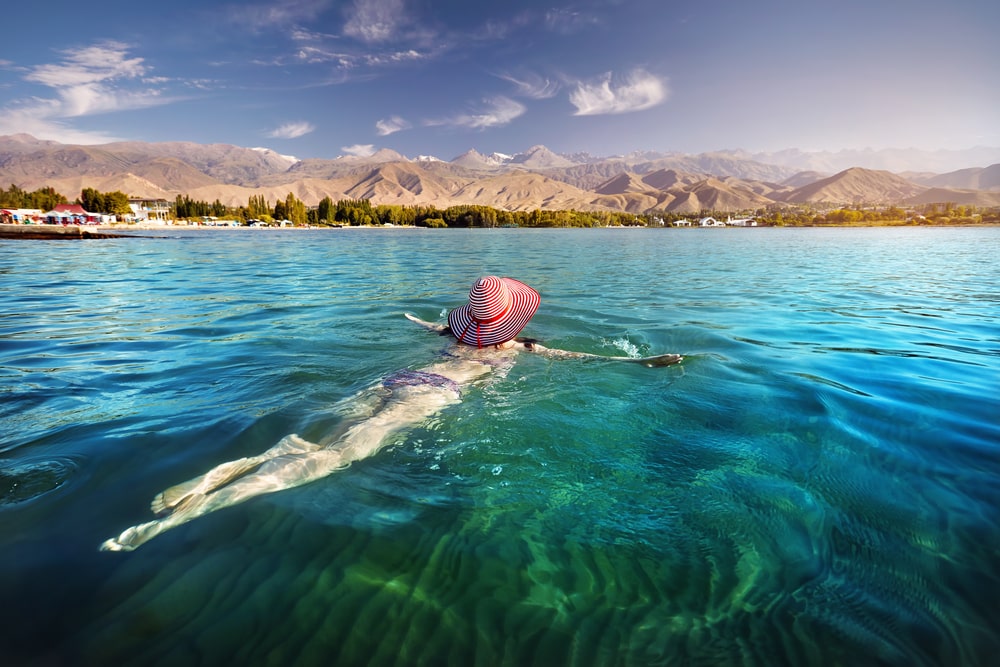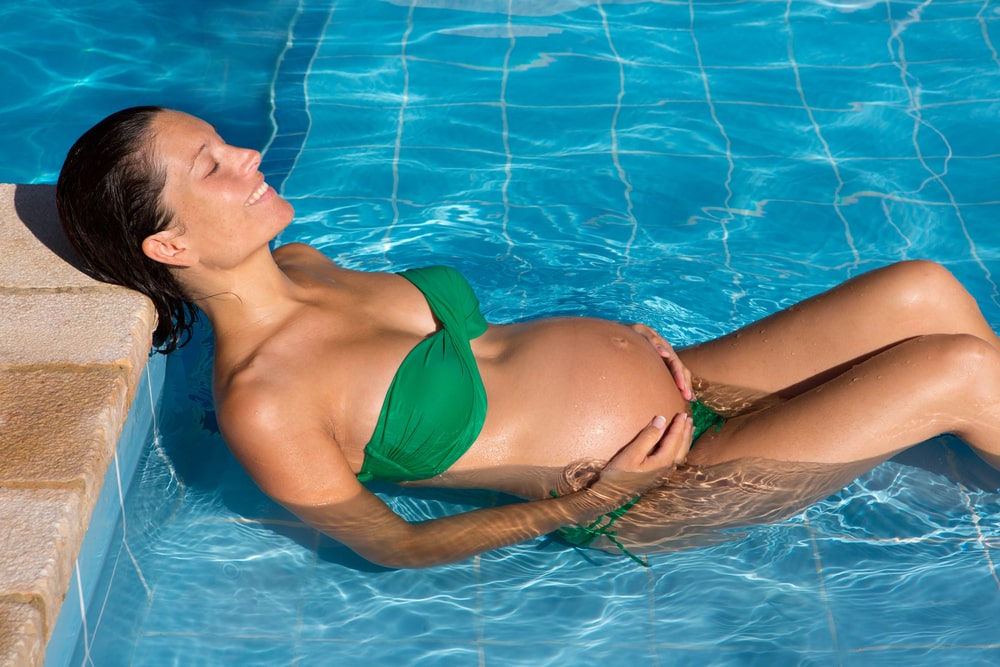Part of having a healthy pregnancy is staying active. Swimming is a great low-impact aerobic exercise that works your entire body, helping to keep you fit and preparing your body for labor.
It is recommended that pregnant women should get at least 21/2 hours of moderate aerobic activity each week.
There is no reason that swimming should not be part of your exercise regime while you are pregnant. But there are a few things that you need to take into consideration as your body changes.
Is Swimming Safe While Pregnant?
According to the American College of Obstetricians and Gynecologists, swimming is considered one of the safest forms of exercise during pregnancy.
Swimming is a low-impact exercise that builds strength and aerobic endurance. It also supports your growing belly and eases pressure on your joints.
Swimming also allows you to continue building good core strength without twisting your abdomen, even quite late in pregnancy.
Swimming is even an approved form of exercise for those undertaking in vitro fertilization (IVF) due to the huge health benefits that it offers while placing a low level of stress on your body.
Swimming In A Lake
Some lakes are ok for swimming in while you are pregnant, but you should avoid swallowing the water as it could be contaminated with bacteria.
View in gallery
It can be difficult to know how deep lake water is, so you shouldn’t swim without a life jacket unless you are swimming with others or are an experienced swimmer.
Lakes can have hidden dangers under the water such as jagged rocks so it is important to wear proper footwear to protect your feet. You should also be aware of boats and other watercraft on the lake and avoid swimming where there is such traffic.
If you go to a lake for a holiday while pregnant, be aware that larger lakes, can also have dangerous rip currents. If you are caught in a rip current, try to maintain your footing, float or tread water, or swim parallel to the shoreline until the current eases.
Swimming In The Ocean
Before you take a step into the ocean there are a few issues that you need to be aware of.
When swimming in the ocean, a pregnant woman needs to be aware of what may be lurking under the surface, such as jellyfish, anemones, and hydroids all of which can sting and cause a lot of pain.
Avoid swimming in areas where sharks are common and never swim alone.
You should try to avoid swallowing sea water as it could be contaminated with untreated sewage from fertilizers, pets, boats, and faulty septic systems.
These chemicals can cause gastrointestinal illness according to the National Oceanic and Atmospheric Administration. Other things that you need to consider are currents, sunburn, and being knocked over by waves.
Swimming In A River
Taking a swim in the river went the weather is hot can help to keep a pregnant body cool, eliminating becoming overheated. But rivers can be dangerous for pregnant women because the water can be contaminated with fecal coliform.
View in gallery
Ingesting this water can be dangerous for pregnant women as it can cause diseases such as giardia and cryptosporidium, which causes loss of energy, nausea, diarrhea, gas, and weight loss.
If you decide to swim in the river make sure that you do not swim alone, avoid areas where there is boat traffic, be aware of currents, and always wear a life jacket.
Swimming with chlorine
Many women are concerned about their exposure to chemicals in their day-to-day lives while pregnant.
So if you are worried about the pool environment and the cleaning chemicals associated with them such as chlorine, you will be happy to know that a study from 2010 suggested that there were no negative birth outcomes associated with cleaning chemicals in pools.
According to that same study, women who swam in pools at the beginning and middle of their pregnancy had a slight decrease in their risk of delivering a preterm baby or a baby with congenital malformations compared to those women who did not exercise.
There is more recent research that has raised concerns about fetal exposure to water cleaning products in pools but the authors of this study have also stated that more data and long-term information is needed.
Things To Consider
While swimming is generally considered a safe activity during pregnancy, it may not be recommended for those with certain medical conditions or restrictions due to pregnancy complications.
You should always check with your medical practitioner before undertaking any physical activities.
Be Aware Of Any Risks
You will need to keep in mind that you may well tire more quickly than when you were not pregnant, consider this if swimming far from shore or the beach.
View in gallery
You will need to consider tides, how rough the water is, and if there are any reports of bacteria in the water before you swim.
Only swim in areas you know are safe. This is not the time to try out a new swimming spot – stick to what is familiar and you know is safe.
Watch That Temperature
Swimming in water that is too hot or too cold can have an impact on both you and your baby.
Swimming in water that is very warm should be avoided while pregnant as this can raise your body temperature. It is important that your body temperature does not rise above 102.2 degrees Fahrenheit.
This is particularly important during the first trimester as a rise in body temperature due to being submerged in hot water could result in birth abnormalities or even potentially miscarriage.
Hot tubs, hot springs, and even very warm baths should be avoided while pregnant.
The flip side of that is that you should also avoid swimming in lakes and oceans during colder weather as this can send your body into shock and this is something that is not good for your developing baby.
All In Moderation
Swimming can be a great exercise while you are pregnant as it poses little risk of falling, does not place any stress on your joints, and in fact, helps to support your growing belly and lower the stress on your joints.
View in gallery
But even with all these advantages, it is still possible to have too much of a good thing. If you over-exert yourself, swimming during pregnancy can become unsafe.
This is the same for any form of exercise during pregnancy. If you begin to feel nauseous, become too hot, or you experience any vaginal discharge such as bleeding, or have abdominal or pelvic pain then you should stop swimming.
Consider keeping your swimming sessions to 30 minutes at a time and around 3-5 sessions a week.
If you are new to swimming it may be worth having a chat with a trainer or coach who can help you deliver a safe routine so that you do not over-exert yourself.
Benefits Of Swimming While Pregnant
During pregnancy, it is encouraged to exercise in order to keep your body healthy and prepares you ready for the rigors of labor ahead.
Exercise has some great general health benefits but there are some additional reasons to consider swimming during your pregnancy:
Swimming is low impact, so your bones and joints won’t have to deal with any additional stress or strain.
Being submerged in water can also help to alleviate some pressure on your body from that growing bump.
Better sleep – which every pregnant woman wants and needs.
Like many other forms of aerobic exercise, a better night’s sleep can be a great side effect of spending some time in the pool.
Water can be a great form of pain relief.
That’s particularly when pregnant, when you may be experiencing swelling or discomfort due to weight gain.
Water is also widely used during labor by means of a pool, shower, or bath. It can help to soothe and lessen the pains that you are experiencing.
Swimming is an exercise that can be done safely in all three trimesters of your pregnancy.
So there is no need to worry about having to top when you reach a certain point.
View in gallery
Swimming may actually help the neurological system of your unborn baby.
A study with pregnant rats showed that through swimming the brain development of her offspring had been altered in a positive way.
This study may indicate that swimming can protect babies against hypoxia-ischemia, a neurological issue. But further study would be required in order to decide this.
Tips For Swimming During Pregnancy
If you do decide that swimming is something you are going to do during your pregnancy, here are a few tips to make it as enjoyable and safe as possible:
Swimsuit
Ensure that you find yourself a good-fitting swimsuit and remember that as your pregnancy progresses, your size and shape will change.
It is no fun trying to squeeze into something that doesn’t fit right, so invest in a comfortable well-fitting swimsuit.
Watch your step
It can be extremely slippery getting in and out of the pool. And remember that your balance is not as good as it was pre-pregnancy due to your growing bump throwing your balance off.
Make sure to walk carefully and be careful in any locker rooms where it is super easy to slip on a puddle of water.
Broad-spectrum sunscreen
If you are swimming outdoors remember that it is easy to burn. In order to avoid this, you need to wear a high factor sunscreen.
Also remember that you should reapply sunscreen frequently and try to avoid swimming outdoors between the hours of 10 am and 4 pm when the sun is at its strongest, increasing your chances of burning.
Plenty of water
Even if you don’t feel thirsty, you can still get dehydrated while swimming. This is due to the feeling of being surrounded by water tricking you into thinking you’re fine.
View in gallery
It is important to take plenty of breaks to drink some water. Avoid alcoholic beverages or drinks high in caffeine that will also encourage dehydration.
Always swim with someone
If you are swimming in an area that does not have a lifeguard, make sure you bring a friend along.
FAQs
Can swimming cause miscarriage?
It is not swimming itself that scientists fear can cause miscarriage or birth defects but the contact with the chlorine and its by-products in the water.
The most common of these are trihalomethanes or THMs, these are volatile compounds that can vaporize from water into the atmosphere.
But swimming is highly recommended for pregnant women as a way to keep in shape as it is not only a great form of exercise but it also supports the pregnant woman increasing weight and pressure on her joints.
However, current evidence does appear to be inconsistent.
How cold of water can you swim in while pregnant?
You should avoid swimming in very cold water as this can cause shock or make you ill, neither of which would be good for your baby.
Always check the water temperature before getting in the water so that you do not endanger your baby’s health.
The Final Thought
Swimming is not the only safe exercise you can do during pregnancy, other low-impact activities such as dancing, walking, cycling, and low-impact aerobics are good options too.
But if you just fancy a dip while you are pregnant as long as you take the relevant precautions there is no reason that you can not enjoy the support and pain relief of a quick dip.






